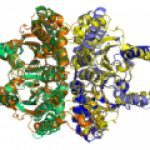Lien vers Pubmed [PMID] – 11972324
Nucleic Acids Res. 2002 May;30(9):1886-94
The survival of individual organisms facing stress is enhanced by the induction of a set of changes. As the intensity, duration and nature of stress is highly variable, the optimal response to stress may be unpredictable. To face such an uncertain future, it may be advantageous for a clonal population to increase its phenotypic heterogeneity (bet-hedging), ensuring that at least a subset of cells would survive the current stress. With current techniques, assessing the extent of this variability experimentally remains a challenge. Here, we use a bioinformatic approach to compare stress response genes with the rest of the genome for the presence of various kinds of repeated sequences, elements known to increase variability during the transfer of genetic information (i.e. during replication, but also during gene expression). We investigated the potential for illegitimate and homologous recombination of 296 Escherichia coli genes related to repair, recombination and physiological adaptations to different stresses. Although long repeats capable of engaging in homologous recombination are almost absent in stress response genes, we observed a significant high number of short close repeats capable of inducing phenotypic variability by slipped-mispair during DNA, RNA or protein synthesis.


